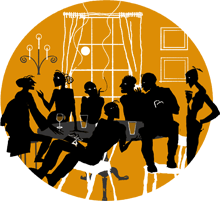United? Kingdom?
Sun, Apr 2 2023 11:30
| Permalink
Saturday 22nd April, 1.00 pm - 5.00 pm
The Arthur Sullivan Room, Birmingham Midland Institute, 9 Margaret Street, Birmingham B3 3BU
Join us for the Birmingham book launch of Taking Control: Sovereignty and Democracy after Brexit (Polity 2023) by Philip Cunliffe, George Hoare, Lee Jones and Peter Ramsay plus a debate on the future of Ireland and another debate on the future of the monarchy.
1.10 pm - 1.40 pm
Book launch
Peter Ramsay, Professor of Law, London School of Economics, will introduce Taking Control: Sovereignty and Democracy after Brexit in conversation with Salon organiser Dave Aveston.
The introduction to the book is available to read on Amazon.
1.45 pm - 3.00 pm
Debate - What is the future for Ireland?
For the best part of a thousand years the history of Ireland has been bound up with that of England. The relationship has never been a stable one. England made many attempts to subjugate and colonise its neighbour. The plantation system which it introduced there acted as a model for later British colonial adventures. The harsh treatment of the Catholic majority was one factor in ensuring that the attempt to incorporate Ireland into the United Kingdom was never likely to succeed for long. Similarly the granting of partial independence and the partition of the island provoked violent upheaval that has never been fully resolved.
The peace agreement put in place by Tony Blair’s government at the end of the 1990s remains one of his proudest achievements. Yet this power-sharing compromise was never likely to resolve the problems in Northern Ireland permanently as it left the status of the province ambiguously poised between Britain and the Republic of Ireland, with neither state claiming ultimate sovereignty over the territory.
When both the UK and Ireland were part of the European community it might have looked as though long-term stability was possible, but this was only achieved by both nations and their people subsuming part of their sovereignty to a larger organisation. The arrangement was always likely to unravel at some point. As it happened the decision by the British people to leave the EU was the event which precipitated this unravelling. While some predicted that Brexit would lead to a renewal of the ‘troubles’, violent unrest has not erupted, but the political system in Stormont has ground to a halt.
Rishi Sunak’s Windsor Framework has been widely lauded as an imaginative and practical solution to the deadlock, but even if it does succeed, it will do so by leaving Northern Ireland subject to certain rules and regulations that do not apply in the rest of the UK. Can the Union survive a trade border within the UK? Can any diplomatic agreement succeed as long as the question of Northern Ireland’s position within the UK remains an anomaly, with a completely different type of government to the rest of the state? Tony Blair’s Good Friday agreement included a provision that, if the majority ever wanted it, Northern Ireland could join the Republic. Is this a realistic possibility? What then are the prospects facing the people of Ireland over the next decade or two? And what contribution if any will people in Britain make to this future?
3.00 pm - 3.30 pm - Break (tea and coffee included in ticket price)
3.30 pm - 4.45 pm
Debate - What is the future of the monarchy
Another aspect of the relation between the monarchy and politics is rarely ever discussed as our speaker, Don Milligan, points out. This is “the role of the monarchy within Parliamentary democracy where the powers of the Crown [giving legitimacy]are exercised by the prime minister and the government of the day without any public or democratic scrutiny”. It means the Prime Minister instructs the monarch to appoint people to the House of Lords, Supreme Court and also to the Privy Council. Three members of the Privy council can convene completely secret meetings of first ministers, ministers and other leading figures in the state. These are not frequent, but should there be any such meetings at all?
Whilst there is a campaign to make Britain a republic, quite often the focus is on the cost of the monarchy and others have argued this is not of the utmost importance compared to the democratic impact. But is the focus on the royal family’s wealth a problem when so many other services are crying out for investment and the King is already very rich? If we had a republic, would we replace the role of monarch in some other form such as a president? Nigel Farage said a republican head of state would be “some sort of duffer, somebody who had failed”. But why would that be? If we had a presidency, how would it interact with Parliament? When we are already supposedly embarrassed by our history and tradition, how could we invest a republic with some foundational principles which might carry it on into the future, a new tradition? Should we keep the monarchy as it is, or just with all its non-Parliamentary trappings for some other reasons? If so, what would they be?
Speakers:
Don Milligan: author, The Embrace of Capital: Capitalism from the Inside (Zero books 2022. Don has been a gay activist, trade unionist, and member of the communist movement for many years.
Tessa Clarke: Tessa is a journalist, author, documentary reporter and blogs at Diary.of.a.Journalist on Instagram. She is the author of two books on free speech, privacy and the royals.
Chair:
Rosie Cuckston
Reading:
What's wrong with the monarchy? Don Milligan, Off the Cuff
The republican anti-aesthetic, Samuel Martin, The Critic
The rational case for a British republic, Mick Hume, Spiked Online
BirminghamSalon
